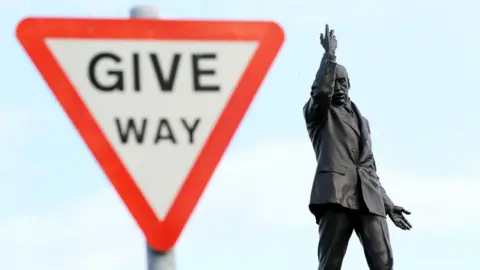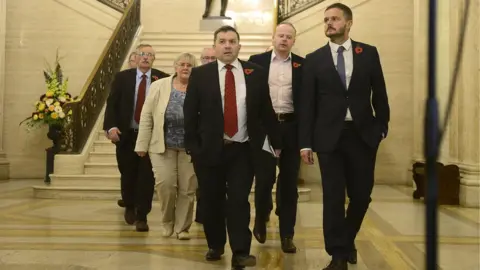Brokenshire to introduce Northern Ireland budget bill
The government has said it will take steps to introduce a budget bill for Northern Ireland at Westminster.
The Democratic Unionist Party (DUP) and Sinn Féin have failed to reach agreement in their talks to restore power-sharing at Stormont.
Sinn Féin said the latest talks had "ended in failure" but added that it was prepared to resume negotiations.
But progress towards a deal has been held up by Sinn Féin's "narrow political agenda", claimed the DUP.
The parties are attempting to end a 10-month deadlock that has left the region without a devolved administration.
Sinn Féin's Stormont leader Michelle O'Neill said her party had tried to be "flexible", but "endless talks without conclusion are not sustainable".
But DUP leader Arlene Foster Northern Ireland Secretary James Brokenshire's decision to go ahead with a budget did not mean negotiations to restore the Stormont executive were over.
Mrs Foster told Irish broadcaster RTÉ: "It's right that he moves ahead with that, but that doesn't stop us continuing to engage with Sinn Féin in trying to find a solution to the problems that we have."
Mr Brokenshire said there were "consequences" of not having an executive in place to put forward budget legislation this week.
The region's civil service has said it will begin to run out of money by the end of November if a budget is not in place, he added.
"No government could simply stand by and allow that to happen," he said.
He would be ready to withdraw the budget bill if an executive is formed before December, added Mr Brokenshire.
The budget will only deal with 2017-18 financial year, he said, adding that it did not mean a return to direct rule from Westminster for Northern Ireland.
'Drift and delay'
But the Labour Party questioned whether the government had done enough to encourage an agreement at Stormont.
Its shadow Northern Ireland secretary Owen Smith said: "The prime minister has not even tried to feign an interest in the affairs of Northern Ireland, only visiting once.
"Drift, delay and the endless setting and re-setting of Plasticine deadlines has contributed to the impasse."

 AFP
AFPAnalysis: Stephen Walker, BBC News NI political correspondent
Questions are being asked by both parties about whether their rival negotiators are interested in striking a deal.
Sinn Féin president Gerry Adams thinks the DUP has not engaged in a serious way about his party's desire to see an Irish language act and provision for same-sex marriage.
For its part, the DUP has always insisted Sinn Fein has put too many barriers in place and introduced too many red lines.
Some think Mr Adams is more interested in matters south of the Irish border than in a restoration of devolution at Stormont.
Unless the atmosphere changes, there is little sign the discussions can be fruitful.

The DUP and Sinn Féin have failed to reach an agreement in spite of numerous rounds of discussions since March's assembly elections.
The vote was called after the Northern Ireland Executive collapsed amid a bitter split over the handling of a botched renewable energy scheme in January.
Sinn Féin's demand for legislation to give official status to the Irish language has become one of the main stumbling blocks in negotiations to restore the executive.
Allow X content?
Mr Campbell said the DUP would not be party to an agreement that "elevates" the Irish language "above health, education and other vital public services".
Sinn Féin said the confidence and supply arrangement between the DUP and the Conservative Party had "compounded" the problems the parties faced.
The prime minister made the £1bn deal with the DUP after losing her majority in Parliament in June's general election.
'Latest possible juncture'
The United States government said "shared political responsibility and pragmatism" was needed from the DUP and Sinn Féin to find an end to their differences.
"Northern Ireland's future will be best served by the establishment and running of an effective, accountable, and responsive government," said its spokeswoman Heather Nauert.
"This is especially true in light of the challenges that Brexit presents for the region."
The Northern Ireland secretary has said he will seek independent advice on what steps should be taken to "reflect the current circumstances in MLA pay".
Mr Brokenshire had previously said he would examine the issue of assembly members' salaries in the absence of devolution, amid calls for their payments to be docked.
 Pacemaker
PacemakerIrish Foreign Affairs Minister Simon Coveney said Mr Brokenshire had taken the budget decision with the "utmost reluctance and at the latest possible juncture".
Both the UK and Irish government had "spared no effort" in supporting the talks between the DUP and Sinn Féin, he added.
"The issues under discussion - particularly those on language and culture - go to the heart of the divisions in society here in Northern Ireland."
SDLP leader Colum Eastwood insisted that the government's budget move amounts to direct rule.
He said it is a step backwards from the Good Friday peace agreement and he criticised Sinn Féin for its role in the deadlock.
Northern Ireland is "coming slowly and deliberately to direct rule at the hands of Sinn Féin and the DUP", according to Ulster Unionist Party (UUP) leader Robin Swann.
He added that Mr Brokenshire would "get no opposition" from the UUP if he decides to reduce MLAs' salaries.
